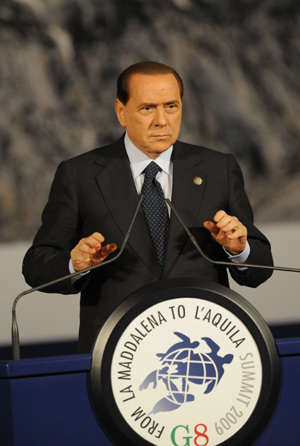World leaders at the Group of Eight (G8) summit ended their three-day gathering Friday with a promise to mobilize 20 billion U.S. dollars to help fight world hunger but made little progress on climate change.
"Working with the G8, African and European countries and multinational bodies, we had the satisfaction of increasing the 15 billion to 20 billion dollars over thee years," Italian Prime Minister Silvio Berlusconi told a press conference after hosting the summit in this central Italian city.

It had been expected that the world leaders would commit 15 billion U.S. dollars to help poor countries promote sustainable agriculture development in the fight against hunger, but the final amount was five billion U.S. dollars more.
"We welcome the commitments made by countries represented at L'Aquila toward a goal of mobilizing 20 billion dollars over three years through this coordinated, comprehensive strategy focused on sustainable agriculture development, while keeping a strong commitment to ensure adequate emergency food aid assistance," the leaders said in a statement.
The impact of the economic crisis on the African continent and food security were the main items on the agenda for the final day of the summit.
The gathering brought together 40 delegations representing almost 90 percent of the world economy, including the G8 industrialized countries and five emerging economies, and numerous international organizations.
Before turning their attention to Africa, the G8 leaders had focused on the economic crisis and the global fight against climate change.
Listing the achievements of the summit, U.S. President Barack Obama said the G8 leaders agreed on the need for collective action and more stimuli to sustain an economic recovery.
"Full recovery is still a ways off. It would be premature to begin winding down our stimulus plans," Obama said.
The G8 leaders on the first day of the summit discussed the world economy and the extraordinary measures taken to counter the global recession.
Hard hit by the financial crisis, the global economy plunged into the worst recession since World War II, prompting world governments to pump massive amounts of money into their stimulus measures.
While noting signs of stabilization and improved confidence, the G8 leaders acknowledged that significant risks remain to economic and financial stability.
They agreed policy action to support the world economy and repair the financial system will continue as long as needed to ensure sustainable and long-lasting growth.
The second day of the summit was dominated by climate change and the gathering was expanded to include leaders from the five emerging economies _ Brazil, China, India, Mexico and South Africa _ under the so-called "8 + 5" format.
For the first time, all of the leaders agreed on Thursday to limit global warming to within 2 degrees Celsius above pre-industrial levels, but failed to approve more substantial targets because of differences between the G8 nations and developing countries.
The G8 leaders agreed Wednesday that emissions should be reduced by at least 50 percent by 2050 and developed countries should lower their emissions by 80 percent by 2050 but they failed to specify any mid-term targets.
Emerging economies would like to see rich nations make deeper cuts in the medium term, namely by 2020. They also want developed countries to provide financing and technology transfer to help the poorer nations in the fight against climate change.
UN Secretary General Ban Ki-moon criticized the 2-degree agreement as insufficient, urging developed countries to take the lead by making firm commitments to reduce their emissions by 2020 in line with the 25 to 40 percent below 1990 level.
"For this to be credible, however, we need ambitious midterm targets and clear baselines," Ban said. "It is disappointing to note that thus far, the midterm emission targets announced by developed countries are not in this range."
World governments will seek a new global pact on climate change to replace the current Kyoto Protocol, which expires in 2012, during a UN meeting in Copenhagen in December.
The G8 includes the world's eight industrialized powers, namely the United States, Britain, France, Germany, Italy, Japan, Russia and Canada. Their annual summit has been joined in recent years by leaders from emerging economies and other developing countries.
(Xinhua News Agency July 11, 2009)